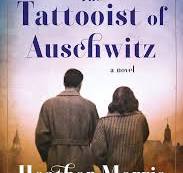Heather Morris
Historical Fiction 2018 | 288 pages
![]()

This short book is another gem ... only this is one everyone SHOULD read, not only might enjoy reading!
The Tattooist of Auschwitz is a story of a young Slovakian Jew named Lale Sokolov who was taken from his home to save his family in 1942, and transported to Auschwitz-Birkenau, a German Nazi concentration and extermination camp, in Poland. While there, he worked as the camp tattooist (Tätowierer) and fell in love with a Slovakian Jewish girl named Gita Furman. She saw no reason to get to know him, initially. To her, "they were never going to leave that place, other than through the chimney." But they did and after the war, the lovers found each again, and were married for 58 years.
As such, the book depicts not only the nightmarish wartime reality, violence, humiliation, degradation, starvation, murder, and completely inhumane day-to-day life at a concentration camp but also describes a love story that survives despite the enormous difficulties.
For many years, this history was known only to the closest family of Lale and Gita. Lale was simply afraid to discuss his past so as not to be accused of collaborating with the Germans. Only after the death of his beloved Gita in 2003, when he first met the writer Heather Morris, did Lale decide to tell Heather about everything that had happened during the war.
Claims of factual inaccuracies have been made by the Auschwitz Memorial Research Center. For example, they say that a tattooist never had this role as his job. The assignment at tattooists was more random and short-term than represented in the book. Somehow, I don't find it necessary to ferret out truth from fiction in "historical fiction." If there is a core element of truth, with attempted research behind it, and the book raises my awareness about a time period or an event, I consider myself well-served.
I heartily recommend this book. It is insightful, yet hopeful.
February 2024

What a fantastic review!
Thank you!
I read this book some time ago. And visited Auschwitz/Birkenau in 2008. The horror of what went on remains with me , as long as I live.
I have visited Dachau and have a similar feeling. I will never forget what I saw there.